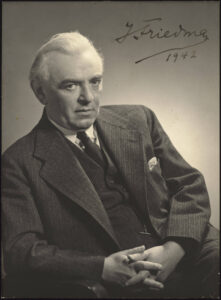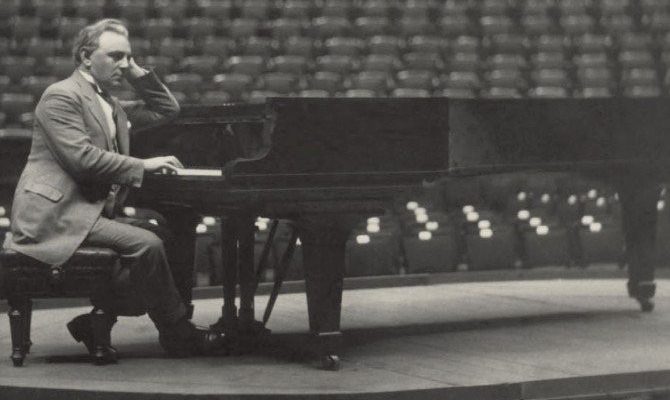The great Polish pianist Ignaz Friedman was born on this day in 1882. The highly individual interpreter was largely ignored by recording companies after his death in 1948: Columbia never issued a single LP (or CD) containing any of several hours’ worth of 78rpm discs he produced for the label. I first read about the artist in Harold C Schonberg’s classic tome The Great Pianists in the mid-1980s, when I first got into historical recordings, and dreamed of finding the Nocturne in E-Flat Op.55 No.2 that he wrote so poetically about; I would have to wait until Schonberg himself gave a lecture in my home town of Montreal in 1988 and played the performance… and naturally, nothing was the same thereafter. (Click here to read a feature I wrote specifically about this recording.)
I soon after finally found a second-hand LP produced by Allan Evans containing some of the pianist’s legendary Chopin recordings, and eventually his discography would be issued with Evans’ diligence, on LP with Danacord and on CD with Pearl, with subsequent issues by a variety of companies, including Evans’ own Arbiter label.
One particularly remarkable Friedman memory is when I first visited Bryan Crimp, founder of the APR label, in May 1990. We went into his studio, which had massive speakers, and one of the discs we listened to was a transfer he had made of Friedman’s glorious reading of Chopin’s Impromptu No.2. I’ll never forget the experience of my body being awash in the waves of sound featuring that glorious tone, soaring phrasing, and magical pedal effects – truly an incredible experience.
Friedman’s playing is not for the faint of heart, particularly as the conception of Romanticism these days is much more sanitized than things actually were during that era and those that immediately followed it. The Polish performer’s pianism is bold and impetuous, quixotic and evocative, individual in a way that can be startling to some listeners today… but truly today’s pianists are by and large individual in a much more self-centred way than was Friedman, despite the stated intention of respecting the score. When Friedman stretches a phrase, he is not just adjusting the timing but also the dynamic shading, tonal colour, and auric quality (via the pedal and touch), as well as its relationship with harmonic and other melodic elements – but modern ears tend to hear things along a single plane and not this multi-dimensional shift.
 Particularly remarkable are Friedman’s legendary traversal of Chopin Mazurkas, which feature a rhythmic pulse and accenting that are completely different from the norm. Yet Friedman actually danced this folk song as a child in his native country, and Chopin was known to have insisted on particular accenting in mazurkas: Schonberg writes of an incident when Meyerbeer visited Chopin and the two ended up in a disagreement of the rhythmic element of his mazurkas, Meyerbeer saying he was playing it 2/4 and Chopin insisting it was 3/4. To those who find Friedman’s readings unsettling, it is worth considering: is there any guarantee that if by some miracle a recording of Chopin was found we would like it? And if not, what does that suggest about our tastes and preferences, when musicians and music lovers today speak so strongly about the need to respect the composer’s wishes and the score?
Particularly remarkable are Friedman’s legendary traversal of Chopin Mazurkas, which feature a rhythmic pulse and accenting that are completely different from the norm. Yet Friedman actually danced this folk song as a child in his native country, and Chopin was known to have insisted on particular accenting in mazurkas: Schonberg writes of an incident when Meyerbeer visited Chopin and the two ended up in a disagreement of the rhythmic element of his mazurkas, Meyerbeer saying he was playing it 2/4 and Chopin insisting it was 3/4. To those who find Friedman’s readings unsettling, it is worth considering: is there any guarantee that if by some miracle a recording of Chopin was found we would like it? And if not, what does that suggest about our tastes and preferences, when musicians and music lovers today speak so strongly about the need to respect the composer’s wishes and the score?
Here is an hour and twenty minutes of Friedman playing Chopin, including that amazing Impromptu and those hair-raising (and eyebrow-raising) Mazurkas – if you’d like to check out a playlist I’ve made of just the mazurkas, click here. (And please note that I didn’t produce this upload – I’m not sure why the image is of a city.) I’m not saying everyone needs to love or even like these recordings – but it is worth listening multiple times, recognizing whatever inclination you might have towards a certain style (and why)… and listening again with fresher ears. There is magic to be found here, and questions to sit with, even if there is no real answer.

Comments: 6
Sublime
So glad you like it!
His Mendelssohn is amazing as well.
Oh, isn’t it though! I just adore those performances… it’s really a shame he didn’t record the complete set, or any complete Chopin cycles. Such an original artist!
Much more alive and truly about the narrative rather than the typical straightforward interpretations. This kind of playing moves your psyche viscerally and reveals much more than what you ever thought the music might have offered in previous performances!
Couldn’t agree more! So glad you find these performances as moving as I do!